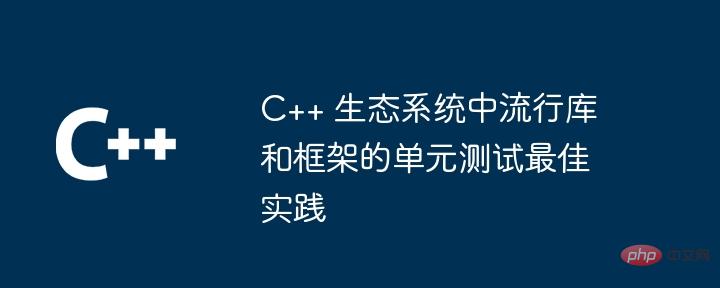
Best practices for unit testing C++ libraries and frameworks include: dependency management (use Google Test and Google Mock to isolate and mock dependencies); improve test coverage (use LLVM Coverage and GCov to measure coverage); test error handling (Use exception expectation mechanism); Perform performance testing (use benchmarks to compare performance).

Unit testing best practices for popular libraries and frameworks in the C++ ecosystem
In the C++ ecosystem, unit testing is A vital means of ensuring code quality and reliability. However, writing effective and efficient unit tests for popular libraries and frameworks has its own unique challenges. This article explores best practices for unit testing of popular C++ libraries and frameworks and illustrates them with real-life examples.
Dependency Management
Dependency management is crucial when testing code that relies on third-party libraries or frameworks. Frameworks like Google Test (gtest) and Google Mock (gmock) provide ways to isolate and mock dependencies. By injecting dependencies into the code under test (DUT), testing can be done in an isolated environment without interacting with the actual dependencies.
// 使用 gmock 模拟一个依赖项
class MockDependency {
public:
MOCK_METHOD(int, doSomething, (), (const));
};
TEST(DUTTest, Test) {
MockDependency mock;
DUT dut(&mock); // 将模拟依赖项注入到 DUT 中
// 设置 mock 期望值并执行被测代码
EXPECT_CALL(mock, doSomething()).WillOnce(Return(10));
int result = dut.callDependency();
// 断言测试结果
ASSERT_EQ(result, 10);
}Test Coverage
Test coverage measures the scope of executed test cases relative to the code. Improving test coverage is critical to ensuring your code is fully tested. Tools such as LLVM Coverage and GCov can be used to measure and report test coverage.
// 使用 LLVM 覆盖率测量测试覆盖率
#include <iostream>
TEST(DUTTest, Test) {
// 使用 ## 运算符为测试用例插入覆盖率标记
std::cout << "Testing something" << "!!";
}After running test cases with the appropriate flags, the coverage tool will generate a coverage report highlighting the portions of the code that were not executed.
Error handling
Libraries and frameworks usually throw exceptions or return error codes to report errors. Testing error handling paths is critical to verify the robustness of your code. The unit testing framework provides Exception expectation mechanism, which allows developers to expect specific exceptions to be thrown when executing the code under test.
TEST(DUTTest, TestWithError) {
// 预期被测代码在特定条件下抛出异常
ASSERT_THROW(dut.callFunction(), std::runtime_error);
}Performance Testing
For libraries and frameworks that involve performance-critical code, performance testing is crucial. Unit testing frameworks often include methods for comparing test performance against specific benchmarks.
TEST(DUTTest, PerformanceTest) {
std::vector<int> vec;
// 设置大数据集和基准重复次数
for (int i = 0; i < 10000; ++i) vec.push_back(i);
BENCHMARK(DUTPerformance, &vec);
}The benchmark will repeatedly execute a specified function a specific number of times and report the execution time.
Practical case: testboost::filesystem
Take the boost::filesystem library as an example, this is Widely used file system manipulation library. You can use the following best practices to write efficient unit tests:
gmock to simulate file system calls. The above is the detailed content of Unit testing best practices for popular libraries and frameworks in the C++ ecosystem. For more information, please follow other related articles on the PHP Chinese website!
 What are the differences between c++ and c language
What are the differences between c++ and c language
 Recommended learning order for c++ and python
Recommended learning order for c++ and python
 Cost-effectiveness analysis of learning python and c++
Cost-effectiveness analysis of learning python and c++
 Is c language the same as c++?
Is c language the same as c++?
 Which is better to learn first, c language or c++?
Which is better to learn first, c language or c++?
 The difference and connection between c language and c++
The difference and connection between c language and c++
 C++ software Chinese change tutorial
C++ software Chinese change tutorial
 Cost-effectiveness analysis of learning python, java and c++
Cost-effectiveness analysis of learning python, java and c++




